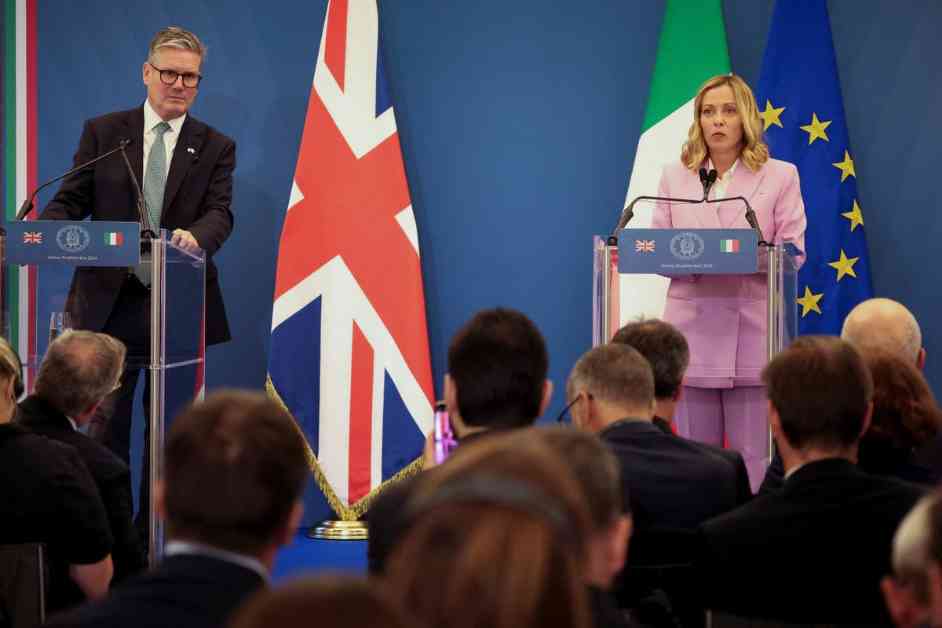Sir Keir Starmer, the Prime Minister of the United Kingdom, has made a significant pledge of £4 million to the far-right Italian government in an effort to address the ongoing migration crisis. This funding is part of an initiative known as the Rome Process, which aims to tackle illegal migration and reduce the flow of migrants into Italy. The decision to provide financial support to Italy comes following a meeting between Sir Keir and Italian Prime Minister Giorgia Meloni in Rome, where they discussed their shared concerns about irregular migration.
During the meeting, Sir Keir expressed his admiration for Italy’s successful efforts in reducing illegal migration by 60% over the past year. He commended the Italian government for working with countries along migration routes to address the root causes of migration and combat criminal gangs that exploit vulnerable migrants. In a joint press conference, Sir Keir stated, “You’ve made remarkable progress working with countries across migration routes as equals, to address the drivers of migration at source and tackle gangs.”
Prime Minister Meloni also highlighted the positive outcomes of their discussions, emphasizing the deep relationship between the UK and Italy. She mentioned that they had signed a joint communique containing significant points of agreement, indicating a shared commitment to addressing the challenges posed by irregular migration. The collaboration between the two leaders reflects a mutual interest in finding effective solutions to the migration crisis that benefits both countries.
Subheadings
UK Investments in Italy
In addition to pledging financial support to Italy for migration-related initiatives, Sir Keir Starmer announced significant investments from Italian companies into the UK. During his visit to Rome, the Prime Minister revealed that Leonardo, a leading defense, aerospace, and security company, will invest £435 million in the UK in 2024. This investment will be directed towards the company’s operations in Yeovil and various technology development and research programs across the country, supporting thousands of employees.
Another major investment announced by Sir Keir was from steel manufacturer Marcegaglia, which will invest £50 million in Sheffield to build a new clean steel electric arc furnace. This investment is expected to create 50 new jobs in the region, contributing to economic growth and job creation in the UK. The investments from Italian companies demonstrate a strong partnership between the UK and Italy, fostering economic cooperation and creating opportunities for growth and development in both countries.
Humanitarian Concerns and Criticisms
While the collaboration between the UK and Italy on migration issues has been met with praise from some quarters, there have also been concerns raised by human rights organizations and critics. Amnesty International has criticized the Italian government’s decision to establish new detention centers in Albania as part of their migration deal, calling it a violation of human rights and international law.
According to Eve Geddie, Director of Amnesty International’s European Institutions Office, the plan to detain asylum seekers in Albania and limit their rights to seek asylum and have their claims assessed fairly is both harmful and unlawful. She expressed disappointment in the Italian government’s willingness to proceed with the agreement despite the criticism and concerns raised by human rights bodies. The establishment of detention centers in Albania raises questions about the treatment of migrants and the protection of their rights under international law.
Political Backlash and Controversy
The decision by Sir Keir Starmer to pledge millions to the far-right Italian government has sparked political backlash and controversy within the UK. Some critics have labeled the move as a concerning alignment with a far-right leader like Giorgia Meloni, whose policies and actions have been divisive and contentious. The meeting between Sir Keir and Ms. Meloni has raised questions about the UK’s approach to migration and cooperation with governments that hold far-right ideologies.
Diane Abbott, a prominent figure in the Labour Party, has criticized Sir Keir for meeting with Ms. Meloni, calling her a “literal fascist” and expressing concerns about the implications of such diplomatic engagements. The meeting has also drawn criticism from other political figures and human rights advocates, highlighting the challenges of balancing political interests with ethical considerations in international relations.
In conclusion, the collaboration between the UK and Italy on migration issues represents a complex and contentious issue that requires careful consideration and scrutiny. While the financial support provided by the UK may contribute to addressing the immediate challenges of irregular migration, it is essential to ensure that human rights and international law are respected in the process. The political implications of aligning with far-right governments like Italy’s raise important questions about the values and principles that guide diplomatic relations and cooperation on global issues like migration.












